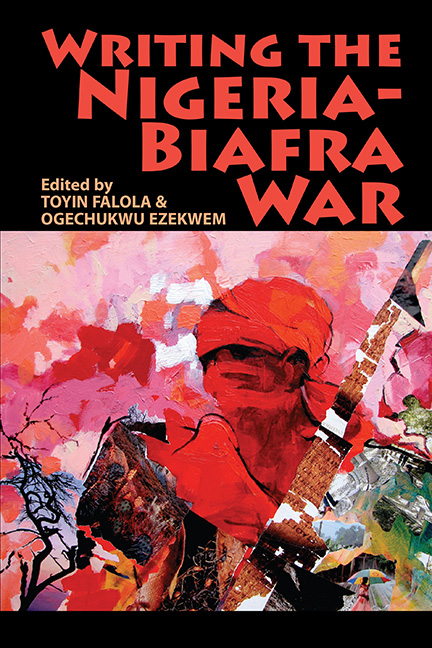Book contents
- Frontmatter
- Contents
- Notes on Contributors
- List of Abbreviations
- Timeline
- Map of Biafra 30 May 1967 – 1 May 1969
- 1 Scholarly Trends, Issues, and Themes: Introduction
- Part I On The History Of The Nigeria-Biafra War
- Part II Critical Debates On The Nigerian Crisis
- Part III The War In Fiction, Memoir, And Imagination
- Part IV Locating Gender In Nigeria-Biafra War Literature
- Select Bibliography
- Index
4 - The Ahiara Declaration and the Fate of Biafra in a Postcolonial/Bi-Polar World Order
Published online by Cambridge University Press: 17 June 2021
- Frontmatter
- Contents
- Notes on Contributors
- List of Abbreviations
- Timeline
- Map of Biafra 30 May 1967 – 1 May 1969
- 1 Scholarly Trends, Issues, and Themes: Introduction
- Part I On The History Of The Nigeria-Biafra War
- Part II Critical Debates On The Nigerian Crisis
- Part III The War In Fiction, Memoir, And Imagination
- Part IV Locating Gender In Nigeria-Biafra War Literature
- Select Bibliography
- Index
Summary
‘Proud Biafrans, I have kept my promise.’
Gen. Emeka Ojukwu, June 1, 1969Background to the Declaration
In order to properly understand why the Igbo leadership considered the Ahiara Declaration a necessity, it is vital to briefly highlight the tide of the civil war on the eve of the historic announcement. But first, it must be underlined that the notion of a ‘civil war’ is a myth for there were no wars in the postcolonial era that did not include multiple foreign involvements. The Nigeria-Biafra War lends credence to this theory in many ways. Both sides in the combat had external support, but the nature of the support was unbalanced and varied. Threatened by starvation, Biafrans received humanitarian aid from different agencies like the Red Cross and Caritas, individuals, and foreign governments, including the United States, France, Haiti, Ivory Coast, Ireland and Israel.
The Nigerian federal government received huge supplies of weaponry and hardware and technical and logistics support mostly from Britain and the then Soviet Union. Egypt sent pilots who flew attack planes against the secessionists. These supplies, whether in the form of weapons, material, logistics, food, medicine, or simply unquantifiable moral and diplomatic assistance, contributed in prolonging the conflict which claimed an estimated 1.5 million easterners, most of them Igbo.
The spike in civilian casualties between 1968 and the first half of 1969 was mainly as the result of aerial bombardments and humanitarian blockades imposed by the federal government. This required that the Biafran leaders speak to the people about the state of things in Biafra and reassure them about their future. Also, given that every secessionist conflict involves territorial claims and resource control, the Biafran soldiers in 1969 appeared to have somehow started to slow down the advancement of the federal troops though they had altogether lost a good chunk of the original Biafran territories. As a recently declassified US memo noted, in late 1968, the secessionist soldiers were still controlling about 10,000 square miles of the Igbo country. This translates to approximately 62 percent of the estimated 16,216 square miles of the Igbo homeland.
Alluding to the successes made by his troops in his speech, the Biafran leader reminded the audience that in the Onitsha front of the war, for instance, his ‘gallant’ soldiers contained the advance of the federal troops who first took control of the town 15 months previously.
- Type
- Chapter
- Information
- Writing the Nigeria-Biafra War , pp. 62 - 80Publisher: Boydell & BrewerPrint publication year: 2016
- 1
- Cited by



